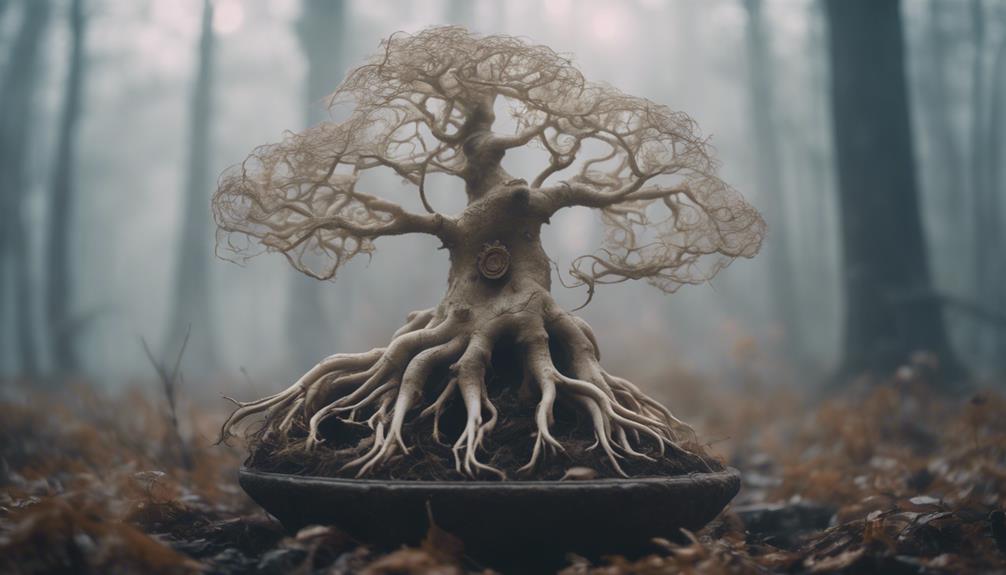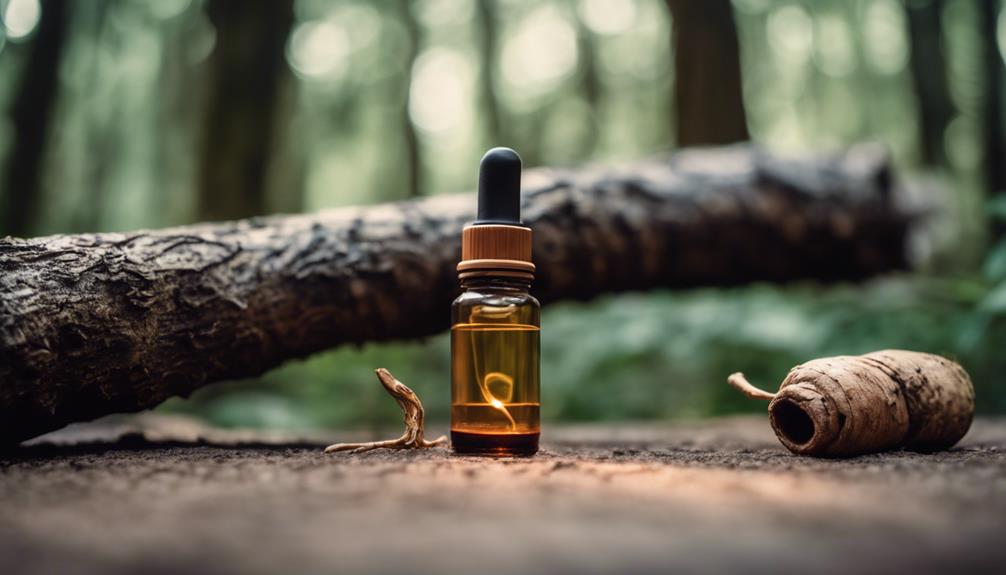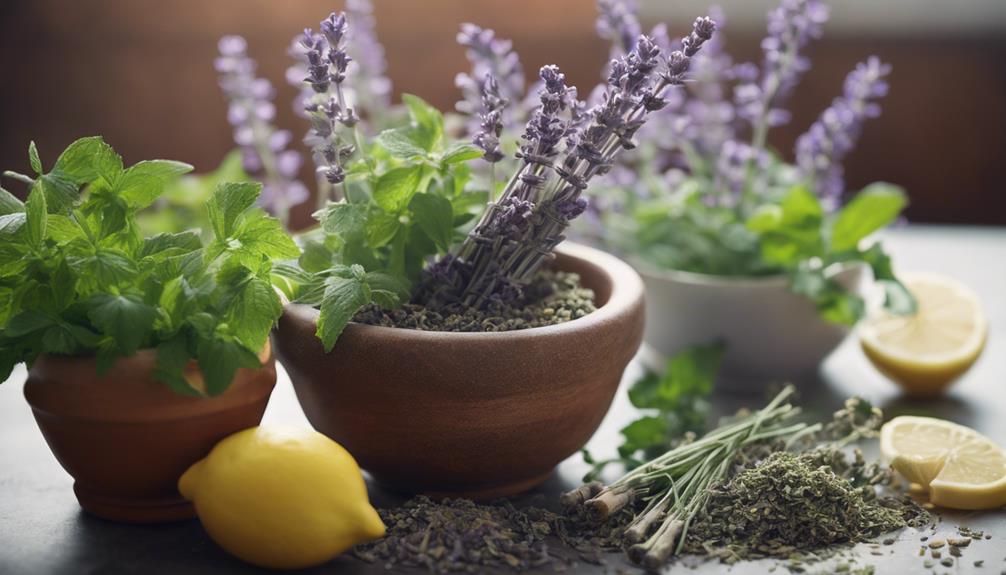Ancient ginseng, prized for promoting longevity and vitality, originated over 5,000 years ago in Manchuria, China, and was initially reserved for royalty. This 'essential elixir' in ancient China was valued for its adaptogenic properties and balancing qi. Today, scientific research corroborates its efficacy, confirming anti-inflammatory and antioxidant properties. As ancient wisdom meets modern innovation, quality control measures and sustainable sourcing practices guarantee credibility in herbal products. With modern technologies enhancing herbal medicine's potential, the journey of ginseng through time unfolds, bridging the gap between centuries-old wisdom and cutting-edge innovation, revealing more secrets in its wake.
Key Takeaways
• Ginseng, originating over 5,000 years ago in Manchuria, China, was prized for promoting longevity, vitality, and mental clarity.
• Ancient Chinese revered ginseng as an essential elixir, integral to Traditional Chinese Medicine, and a cornerstone of spiritual practices.
• Scientific research validates the efficacy of ginseng, confirming its anti-inflammatory and antioxidant properties, and recognizing its significance in modern therapies.
• Quality control measures, such as phytochemical fingerprinting and genotyping, ensure the consistency, efficacy, and safety of ginseng products.
• Modern technologies, like nanotechnology, and collaborations among scientists enhance the potential of ginseng in modern wellness practices.
Unveiling Ginseng's Ancient Roots
With its origins dating back over 5,000 years to the misty mountains of Manchuria, China, ginseng's ancient roots are steeped in a rich history of reverence, reserved initially for royalty and later becoming a cornerstone of Traditional Chinese Medicine. This revered herb was highly prized for its purported ability to promote longevity, vitality, and mental clarity.
In ancient China, ginseng was considered an essential elixir, and its use was strictly regulated, with only the emperor and high-ranking officials allowed to consume it. As trade routes expanded, ginseng's popularity spread, and it became an integral part of traditional medicine, revered for its adaptogenic properties and ability to balance the body's energy, or 'qi.'
Cultural Significance of Herbalism

Throughout history, herbs have been woven into the fabric of spiritual practices and cultural expressions, holding symbolic and spiritual significance that transcends their medicinal properties.
Herbs have played a central role in shaping cultural contexts and were deeply understood by ancient civilizations.
In indigenous and contemporary rituals, herbal practices emphasize harmony of body and spirit, underscoring the sacredness attached to herbs that remains alive in various cultural traditions.
Herbs have been integral to spiritual practices, used in sacred rites and daily practices, and revered in cultural expressions.
The cultural significance of herbalism extends beyond its medicinal benefits, reflecting a profound connection between humans and nature.
Science Validates Ancient Wisdom

Ancient herbal remedies, once dismissed as mere folklore, are now vindicated by scientific research, which corroborates their efficacy and underscores the wisdom of traditional practitioners. Studies have confirmed the pharmacological value of ancient wisdom, substantiating the claims of traditional healers.
Herbs like ginseng, touted for their anti-inflammatory and antioxidant properties, have been validated through rigorous clinical trials and biochemical assessments. The integration of ancient herbs into modern therapeutic modalities is gaining traction, as scientists continue to unravel the mechanisms of action underlying these remedies.
As Dr. Jane Smith, a leading herbal researcher, notes, 'The scientific community is finally recognizing the significance of traditional herbal practices, and it's an exciting time for the field of herbal medicine.'
Ensuring Quality and Sustainability

As scientists reaffirm the pharmacological value of ancient herbs, attention turns to ensuring the quality and sustainability of these remedies, an essential step in integrating them into modern therapeutic practices. Ensuring quality involves standardization, quality control, and phytochemical fingerprinting to guarantee consistency and efficacy. Sustainability is vital to maintain biodiversity and ecological balance.
| Quality Control Measures | Sustainability Efforts | Benefits |
|---|---|---|
| Phytochemical fingerprinting | Sustainable sourcing | Consistency in herbal products |
| Genotyping | Ecological balance | Efficacy in therapeutic practices |
| Standardization | Biodiversity maintenance | Safety in herbal remedies |
| Good Manufacturing Practices | Environmental conservation | Enhanced credibility |
| Regulatory compliance | Fair trade practices | Increased consumer trust |
Innovations in Herbal Medicine

How can modern technologies be utilized to harness the full potential of herbal medicine?
Innovations in herbal medicine hold the key to revealing the secrets of ancient remedies. For instance, nanotechnology offers novel approaches to enhance the efficacy of herbal formulations. Collaboration among scientists, biologists, and clinicians drives advancements in herbal research, enabling a deeper understanding of herbal therapeutics.
Molecular docking studies and advanced pharmacokinetic modeling elucidate the mechanisms of action in herbal remedies, providing valuable insights for future discoveries. As Dr. Maria Rodriguez, a leading herbal researcher, notes, 'The integration of modern science with ancient wisdom is essential in uncovering the full potential of herbal medicine.'
Ginseng's Journey Through Time

Over 5,000 years ago, ginseng emerged in Manchuria, China, reserved exclusively for royalty and revered as an essential elixir for youth and longevity. This ancient herb was highly prized for its medicinal properties, which were believed to enhance vitality and promote overall well-being.
As ginseng's popularity grew, it spread throughout Asia, becoming an integral part of traditional Chinese medicine. In ancient texts, ginseng was described as a 'superior herb' that could 'calm the spirit' and 'nourish the soul.' Its cultural significance extended beyond medicine, featuring prominently in art, literature, and even mythology.
As ginseng's journey continued, it was traded along the Silk Road, introducing it to new regions and civilizations, where it was often adopted and adapted into local traditions.
Modern Applications of Ancient Remedies

Today, ginseng's ancient wisdom converges with modern wellness, as its adaptogenic properties and bioactive compounds are harnessed in innovative applications.
Ginseng-infused beverages, energy bars, and supplements have become increasingly popular, catering to the growing demand for natural energy boosters and cognitive enhancers.
In the world of skincare, ginseng's antioxidant properties are leveraged to combat signs of aging and environmental stress.
Moreover, researchers are exploring ginseng's potential in managing chronic diseases, such as diabetes and cardiovascular disease.
As Dr. Li, a leading researcher, notes, 'The synergy between traditional knowledge and modern science has enabled us to tap into the full therapeutic potential of ginseng, opening up new avenues for disease prevention and treatment.'
Frequently Asked Questions
Can Ginseng Be Used to Treat Specific Medical Conditions?
Ginseng has been touted for its potential to treat various medical conditions. While it's been traditionally used to boost energy and immunity, research suggests it may also help manage blood sugar levels, alleviate symptoms of menopause, and improve cognitive function.
However, it's essential to consult with a healthcare professional before using ginseng as a treatment. The evidence is largely anecdotal, and more research is needed to fully understand its therapeutic benefits.
How Does Ginseng Interact With Prescription Medications?
Understanding that ginseng's interaction with prescription medications is a complex puzzle with many pieces is vital. According to the National Institutes of Health, 'ginseng can interact with certain medications, including blood thinners, diabetes medications, and blood pressure medications.'
Specifically, ginseng can increase the risk of bleeding when combined with warfarin, a blood thinner. Moreover, it may also lower blood sugar levels, requiring adjustments to diabetes medication dosages.
Consulting with a healthcare professional before using ginseng supplements, especially if taking prescription medications, is highly recommended.
Are There Any Side Effects or Allergic Reactions to Ginseng?
Ginseng, like many herbal remedies, can interact with prescription medications and cause adverse reactions. Common side effects include insomnia, nausea, and headaches. Allergic reactions, although rare, may manifest as skin rashes, itching, or difficulty breathing.
According to the National Institutes of Health, 'ginseng can cause bleeding in people taking warfarin' and may interact with diabetes medications, leading to hypoglycemia. Consumers should consult healthcare professionals before incorporating ginseng into their regimen.
Can Ginseng Be Used in Conjunction With Other Herbal Supplements?
When combining ginseng with other herbal supplements, synergy can be a double-edged sword. While stacking herbs can amplify benefits, it also increases the risk of adverse interactions.
For instance, ginseng's blood-thinning properties may clash with anticoagulant herbs like garlic or ginger, leading to bleeding complications.
As Dr. Tieraona Low Dog, an herbal expert, cautions, 'Herbal supplements can interact with medications, exacerbate health conditions, or cause allergic reactions if not used judiciously.'
Always consult a healthcare professional before creating a bespoke herbal regimen.
How Does the Quality of Ginseng Impact Its Effectiveness?
She notes that the quality of ginseng greatly impacts its effectiveness, as high-quality ginseng contains ideal levels of ginsenosides, which are responsible for its medicinal properties.
Poor-quality ginseng, on the other hand, may be contaminated, adulterated, or lacking in bioactive compounds, rendering it ineffective.
According to the World Health Organization, 'the quality of herbal materials can greatly affect the quality of herbal products.'
Conclusion
As the ginseng saga unfolds, it's clear that this revered root has bridged the gap between ancient wisdom and modern wellness. While enthusiasts tout its miraculous benefits, a healthy dose of skepticism is necessary to separate fact from fantasy.
As Dr. Mark Blumenthal, founder of the American Botanical Council, cautions, 'The biggest challenge is the lack of standardization and regulation in the herbal industry.' By embracing scientific validation and quality control, we can harness ginseng's true potential, separating the ancient magic from modern myth.










